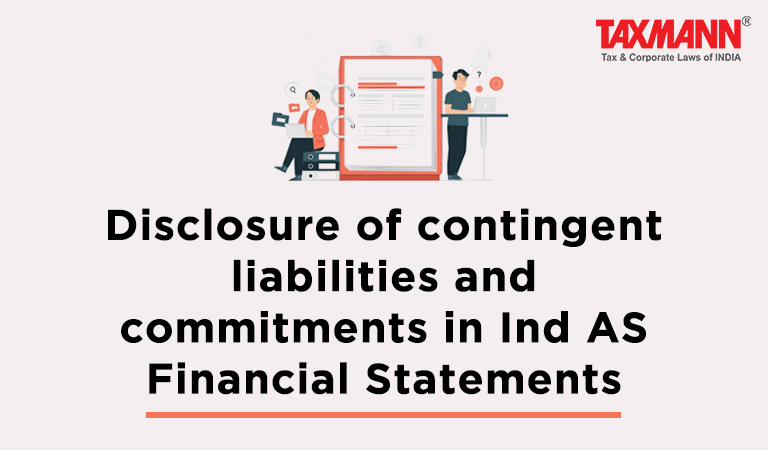Disclosure of contingent liabilities and commitments in Ind AS Financial Statements
- Blog|News|Account & Audit|
- < 1 minute
- By Taxmann
- |
- Last Updated on 1 March, 2022

Contingent Liabilities are not recognized in the books of accounts. However, Ind AS-37 Provisions, Contingent Liabilities and Contingent Assets, requires the disclosure of contingent liability in the Financial Statements, if the possibility of an outflow of resources embodying economic benefits is not remote. Also, Ind AS Schedule III requires the disclosure pertaining to various commitments such as Capital commitments, other commitments, and uncalled liability on shares
A contingent liability is:
(a) a possible obligation that arises from past events and whose existence will be confirmed only by the occurrence or non-occurrence of one or more uncertain future events not wholly within the control of the entity; or
(b) a present obligation that arises from past events but is not recognised because:
(i) it is not probable that an outflow of resources embodying economic benefits will be required to settle the obligation; or
(ii) the amount of the obligation cannot be measured with sufficient reliability.
The word ‘commitment’ has not been defined in Schedule III. The Glossary of Terms Used in Financial Statements issued by ICAI defines ‘Capital Commitment’ as future liability for capital expenditure in respect of which contracts have been made. Hence, drawing inference from such definition, the term ‘commitment’ would simply imply future liability for contractual expenditure.
Click Here To Read The Full Story
Disclaimer: The content/information published on the website is only for general information of the user and shall not be construed as legal advice. While the Taxmann has exercised reasonable efforts to ensure the veracity of information/content published, Taxmann shall be under no liability in any manner whatsoever for incorrect information, if any.

Taxmann Publications has a dedicated in-house Research & Editorial Team. This team consists of a team of Chartered Accountants, Company Secretaries, and Lawyers. This team works under the guidance and supervision of editor-in-chief Mr Rakesh Bhargava.
The Research and Editorial Team is responsible for developing reliable and accurate content for the readers. The team follows the six-sigma approach to achieve the benchmark of zero error in its publications and research platforms. The team ensures that the following publication guidelines are thoroughly followed while developing the content:
- The statutory material is obtained only from the authorized and reliable sources
- All the latest developments in the judicial and legislative fields are covered
- Prepare the analytical write-ups on current, controversial, and important issues to help the readers to understand the concept and its implications
- Every content published by Taxmann is complete, accurate and lucid
- All evidence-based statements are supported with proper reference to Section, Circular No., Notification No. or citations
- The golden rules of grammar, style and consistency are thoroughly followed
- Font and size that’s easy to read and remain consistent across all imprint and digital publications are applied



 CA | CS | CMA
CA | CS | CMA
